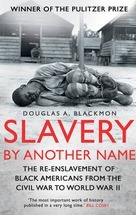 As a writer of made-up stories, I’m increasingly in awe of writers who tell stories about real people, reconstructed from historical evidence, and increasingly drawn to reading them.
As a writer of made-up stories, I’m increasingly in awe of writers who tell stories about real people, reconstructed from historical evidence, and increasingly drawn to reading them.
This book is about the way in which, after the formal abolition of slavery, white Southern society was able to reintroduce black slavery in a new, but equally brutal, form which continued to exist until 1945: well into living memory. Douglas Blackmon brings this story alive by repeatedly drawing out individual lives from the historical backdrop: real tragedies, real attrocities, and occasional real acts of courage. It’s a history book, and a very harrowing one, but its also a real page-turner.
The way the new form of slavery worked was by sentencing people to hard labour and then selling them on to local employers. This happened at the state level, but it happened in an extraordinarily off-hand and corrupt way also at county level, where local officials would arrest black people as a source of saleable slave labour, often on trivial or made-up charges, such as playing with dice, talking loudly in the presence of white women, ‘vagrancy’ or riding in empty freight cars. Leaving their employment without permission of their employer was also a criminal offence. They’d be found guilty in a flimsy quasi-legal process in which they’d have no legal representation and then required to pay fines and court expenses which they could not afford. At this point, a white farmer, logging camp operator or mining company would come forward and agree to pay the fine in exchange for so many months of labour. At times of need (harvesting time for instance), large numbers of black men might be rounded up in this way, and sometimes specific black men, known to be good workers, would be arrested in this way at the request of would be purchasers.
These convicts (even if only convicts for using bad language or dropping litter) were then bought and sold by one employer to another, whipped, tortured, forced to work very long hours and live in appalling conditions and not infrequently killed (unlike antebellum slave owners these new masters had no long-term interest in keeping ‘their’ slaves healthy and alive). They were also routinely kept on far beyond their original notional ‘sentence’ by being charged with additional offences or required to pay off additional debts in a system where there was close collusion between white public officials and white purchasters, and no sort of checks or balances whatever for black people, who’d been excluded from juries, excluded from participation in government, and were kept in a permanent state of fear, not only by this quasi-judicial form of oppression, but by lynchings, and by the most amazingly coarse, open, brutal and contemptuous kind of racism. A governor of Georgia, pardoning a white man charged with rape, comments that he seriously doubts that it possible to commit the crime of rape against a black woman, so voracious and uncontrollable are black women’s sexual appetites (a view which of course gives white men carte blanche to indulge their own sexual appetites with any black woman they like). A white US senator from the South, hearing news of a lynching in Illinois, comments that at last the Northerners are learning how to kill and burn niggers.
The double standards are breath-taking. Black people are controlled by a mendacious, sadistically brutal and sexual predatory system because they are supposedly untrustworthy, violent and unable to control themselves sexually. White men who’ve beaten and murdered black slaves escape prosecution or (occasionally) receive the most desultory fines, while black men are sentenced to work for months in darkness under the whip for riding an empty freight car.
Blackman’s concluding message is to remind us that the historical burden from under which black people in the US are trying to emerge is much much more recent than most people would like to admit. (And of course disenfranchisement and segregation went on much longer even than this particularly form of slavery. The year that Rosa Parks was arrested for refusing to give up her seat to a white man was the year in which I was born.) What this book vividly and painfully shows is that those who are denied power and political participation are also denied justice and truth, but I guess it also shows that those who have power also, in a way, deny themselves the truth, for their power gives them the ability to replace reality with their own self-serving projections. Having power over others which we haven’t earned turns us into babies.
Wondering how things had moved on since those days, I found myself looking up the websites of Southern state legislatures. I was somewhat relieved to find that in George and Alabama, the proportion of legislators who are black seems to roughly correspond with the proportion of black people in the population in general, which is surely progress of some sort. It’s a curious quirk of US history that all the black legislators seemed to be members of the Democratic party, the party of segregation, and the ruling party under which the attrocities described by Blackmon took place, while the representatives of the Republican Party, the party of emancipation, seemed to be entirely white.
I recommend this book, which came out in 2009 and won the Pulitzer Prize. It has several excellent reviews on Amazon UK. Oddly, and I wondered why this was, there were no reviews of it all on amazon.com.